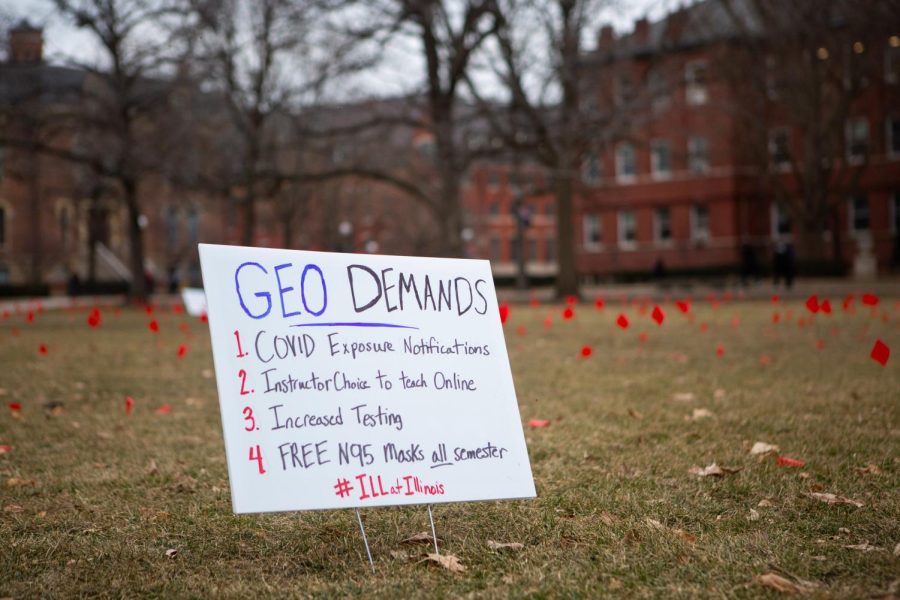GEO demands worker choice in format of classes, more measures against pandemic
A sign with demands from GEO is displayed on the quad on Tuesday. GEO has now issued a petition in regards to graduate student safety.
February 3, 2022
A petition issued by the Graduate Employees Organization highlights concerns about the spread of the Omicron variant amidst a return to in-person classes, and has drawn over 1,300 signatures since Jan. 15.
The petition demands that the University devote more resources to containing the spread of Omicron, in addition to giving graduate students the choice to host classes online or in a hybrid format.
One of the key issues that has affected graduate students in the shift to in-person classes is the lack of a centralized University policy on exposures and shifting to hybrid format. Policy often varies by college and department.
Chelsea Birchmier, graduate student and teaching assistant in LAS, noted that having an in-person teaching obligation may put other people that she interacts with in danger of contracting the virus.
“My clinical fellowship requires me to be around older people who could be affected severely by Omicron,” Birchmier said.
Get The Daily Illini in your inbox!
Contact tracing and testing are both key elements of the petition. All contact tracing in Illinois is now handled through the Illinois Department of Public Health on a more limited basis.
Awais Vaid, deputy administrator and epidemiologist for Champaign-Urbana Public Health District, said large-scale testing and contact tracing is no longer the most effective use of resources.
“It would have been feasible maybe last year, but not anymore because the entire case investigation and contact protocol has changed as of Jan. 1,” Vaid said.
Chancellor Jones wrote an email response to the petition on Jan. 26 emphasizing the University’s cooperation with CUPHD. Jones also stated that the statewide change in contact tracing has necessitated a shift in University policy.
Due to the new centrally managed process, “notification of new positive cases on a class-by-class basis is not feasible and that the data would be too incomplete and too delayed to add any additional protection,” Jones wrote.
Adam Farcus, a graduate student in the department of linguistics, mentioned that the reduced role of contact tracing has impacted their department’s attendance policy.
“I am not allowed to give students excused absences when they believe that they were exposed to COVID-19,” Farcus said. “If you kissed your partner yesterday and they tested positive for COVID-19, I would not be able to give you an excused absence for class today.”
Both Farcus and Birchmier attested that these policies are set forth by individual departments, and that the University has not issued a broader policy on these matters.
Vaid mentioned that the Omicron variant can spread quickly regardless of many of the safety measures used earlier in the pandemic.
“We do know that it’s easy to spread in a classroom setting even with half capacity or three-quarters capacity,” Vaid said.
GEO Co-President Lesley Owens emphasized that an ideal system would require bi-weekly testing for all students and notify professors and teaching staff directly of cases within their class. This would allow teachers to make informed decisions about whether to switch to hybrid or online format.
Vaid mentioned that like social distancing, testing the entire community is less effective because of the increased transmissibility of the Omicron variant.
“I don’t think that testing two, three, or even seven times a week is the most appropriate use of resources,” Vaid said. “We are moving now from a pandemic stage to learning to live with COVID-19 through an endemic stage. What is more important is to consider how we can protect the most vulnerable populations and keep hospitalizations down.”
Vaid noted that the University has had virtually no impact on the status of hospitals in the area since fall 2021, crediting a high vaccination and booster rate.
Although Jones emphasized the University’s adherence to CUPHD guidance, the letter did not go into significant detail about the demands for student choice.
“We have strongly encouraged unit executive officers and supervisors to demonstrate flexibility and compassion in helping our staff, instructors and faculty to navigate the challenges the pandemic is bringing to them and to their families,” Jones wrote.
“As we have done since the arrival of COVID-19, we will continue to monitor the data carefully, consult with our SHIELD science experts and to work with CUPHD as the semester moves forward,” said Robin Kaler, University spokesperson, in an email.
Despite this encouragement, the lack of a central policy regarding instructor choice continues to be an issue for both graduate students and professors. The University has an exemption process for those with medical conditions, but there is no similar process for those with other concerns.
For graduates, such as Chelsea Birchmier, personal choice can help protect populations that are more vulnerable than the University community.
tdemouy2@dailyillini.com







